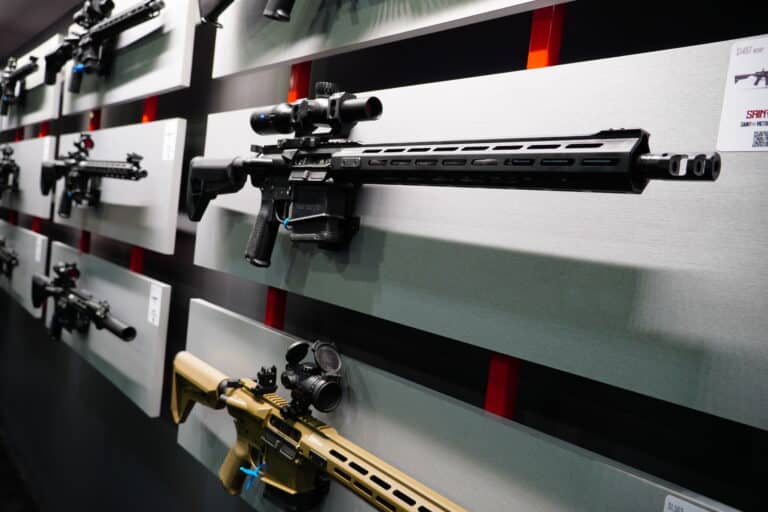The Supreme Court of the United States (SCOTUS) rejected two major Second Amendment challenges on Monday.
In its morning order list, SCOTUS denied certiorari in Snope v. Brown and Ocean State Tactical v. Rhode Island. Those were appeals of lower court rulings upholding Maryland’s AR-15 sales ban and Rhode Island’s magazine capacity limits, respectively. While the Court had relisted the pair of cases 15 times before ultimately denying them, the only explanation offered by any of the Justices said more time is needed for the High Court to decide the issues.
“Opinions from other Courts of Appeals should assist this Court’s ultimate decisionmaking on the AR–15 issue,” Justice Brett Kavanaugh wrote in a statement on the Snope denial. “Additional petitions for certiorari will likely be before this Court shortly and, in my view, this Court should and presumably will address the AR–15 issue soon, in the next Term or two.”
Justices Clarence Thomas, Samuel Alito, and Neil Gorsuch dissented on the denial of both cases. While Kavanaugh wrote a statement in Snope, he did not write one in Ocean State Tactical. Justices John Roberts, Amy Coney Barrett, Sonia Sotomayor, Elana Kagan, and Ketanji Brown Jackson did not dissent or write statements in either case.
The denial is a blow for gun-rights activists, whose top legal priority has long been overturning bans on AR-15s and magazine limits. It means Maryland and the other eight states, plus the District of Columbia, that currently ban the sales of AR-15s and similar firearms will be able to continue enforcing those bans for the foreseeable future.
The denial also means there aren’t four justices willing to take up a case on the two hot-button hardware bans since that’s the number required to grant cert. It heightens questions about what the five justices who either didn’t dissent or issue a statement in either case think of the bans, especially conservative justices Roberts and Barrett.
Justice Kavanaugh’s statement in the Snope denial may provide some hope for gun-rights advocates in the long run, though, depending on how closely his thinking matches Roberts and Barrett. That’s because he wrote both that the Court’s decision not to take up the case did not mean a majority agreed with the Fourth Circuit’s ruling upholding Maryland’s AR ban and that he was highly skeptical of that ban. He argued AR-15s are probably popular enough to meet the “common use” standard developed in the Court’s 2008 US v. Heller ruling.
“This case primarily concerns Maryland’s ban on the AR–15, a semi-automatic rifle. Americans today possess an estimated 20 to 30 million AR–15s,” he wrote. “And AR–15s are legal in 41 of the 50 States, meaning that the States such as Maryland that prohibit AR–15s are something of an outlier. Given that millions of Americans own AR–15s and that a significant majority of the States allow possession of those rifles, petitioners have a strong argument that AR–15s are in ‘common use’ by law-abiding citizens and therefore are protected by the Second Amendment under Heller.”
Kavanaugh even went so far as to outright say the lower court’s ruling is on shaky ground.
“In short, under this Court’s precedents, the Fourth Circuit’s decision is questionable,” he wrote. “Although the Court today denies certiorari, a denial of certiorari does not mean that the Court agrees with a lower-court decision or that the issue is not worthy of review.”
Kanavaugh was not the only one to talk about the Snope denial. Justice Clarence Thomas issued a written dissent where he sharply disagreed with Kavanaugh’s call for further lower court examination of the issue.
“I would not wait to decide whether the government can ban the most popular rifle in America. That question is of critical importance to tens of millions of law-abiding AR–15 owners throughout the country. We have avoided deciding it for a full decade,” he wrote. “[F]urther percolation is of little value when lower courts in the jurisdictions that ban AR–15s appear bent on distorting this Court’s Second Amendment precedents.”
Thomas also criticized the lower court’s ruling. He argued the Fourth Circuit misunderstood and misapplied the Supreme Court’s Second Amendment precedents.
“The Fourth Circuit placed too high a burden on the challengers to show that the Second Amendment presumptively protected their conduct,” he wrote. “And, its determination that AR–15s are dangerous and unusual does not withstand scrutiny.”
He said the lower court ignored Heller‘s “common use” test in favor of one focused on the military usefulness of the firearms in question. He argued that was wrongheaded and the Court ought to take action to reverse the lower court.
“The Fourth Circuit nevertheless eschewed any inquiry into the commonality of AR–15s and the purposes for which they are used, which it dismissed as an ‘ill-conceived popularity test.’ Instead, the court performed its own independent investigation of AR–15s’ ‘utility for self-defense,’ examining their ‘military origin,’ ‘firepower,’ and ‘muzzle velocity,’ among other features,” Thomas wrote. “Our Constitution allows the American people—not the government—to decide which weapons are useful for self-defense.”
Thomas made many of the same points in a dissent last year when the Court declined to take up Harrel v. Raol, which challenged a similar ban in Illinois. However, this time, he argued the Court’s decision to uphold a Bureau of Alcohol, Tobacco, Firearms, and Explosives (ATF) rule that gave the agency broad latitude to decide when unfinished parts are considered regulated parts under federal law added a new level of urgency to the question of AR-15 bans.
“The constitutional status of AR–15s is all the more urgent after this Court’s decision in Bondi v. VanDerStok,” he wrote. “‘[E]very single AR–15 can be converted to a machinegun using cheap, flimsy pieces of metal—including coat hangers.’ Thus, on the Court’s logic, it seems that ATF could at any time declare AR–15s to be machineguns prohibited by federal law. Until we resolve whether the Second Amendment forecloses that possibility, law-abiding AR–15 owners must rely on the goodwill of a federal agency to retain their means of self-defense. That is ‘no constitutional guarantee at all.'”
UPDATE 6-2-2025 7:35 PM EASTERN: This piece has been updated with further information from the order list.







Only Members can view comments. Become a member today to join the conversation.